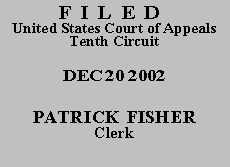

| LEE DAVID HUMPHREY,
Petitioner-Appellant, v. VANCE EVERETT, Warden of the Wyoming State Penitentiary; WYOMING ATTORNEY GENERAL; MARK MCKINNA, Warden of Crowley County Correctional Facility, Respondents-Appellees. |
|
Pro se appellant Lee David Humphrey was convicted of two counts of second-degree sexual assault of his daughter, and his conviction was affirmed by the Wyoming Supreme Court. See Humphrey v. State, 962 P.2d 866 (Wyo. 1998). He petitioned the district court for habeas relief under 28 U.S.C. § 2254 and was denied relief. He now seeks a certificate of appealability (COA) from this court.
Mr. Humphrey petitioned the federal district court for habeas relief on the following grounds:
(1) erroneous admission of prior bad act evidence;
(2) erroneous admission of expert testimony;
(3) erroneous admission of prejudicial testimony by William D. Hansen;
(4) erroneous admission of prejudicial testimony by Marilyn Davis Newman;
(5) erroneous admission of prejudicial hearsay testimony;
(6) erroneous admission of prior consistent out-of-court statements; and
(7) denial of a fair trial through ineffective assistance of counsel.
In his application for COA, Mr. Humphrey appears to confine himself to the issue of whether the federal district court violated his due process rights in delaying decision of his habeas petition.(1)
We grant COA only where there is a substantial showing of denial of a constitutional right. 28 U.S.C. § 2253(c)(2). In other words, the petitioner must demonstrate that jurists of reason could debate whether the petition should have been resolved in a different manner. Slack v. McDaniel, 529 U.S. 473, 484 (2000).
Having reviewed the arguments and materials submitted by Mr. Humphrey and the district court's decision, we conclude that Mr. Humphrey has failed to meet this standard. Accordingly, the application for COA is DENIED and the appeal is DISMISSED for substantially the reasons stated by the district court. Mr. Humphrey's motion to proceed in forma pauperis is GRANTED.
Entered for the Court
Senior Circuit Judge
*. This order and judgment is not binding precedent, except under the doctrines of law of the case, res judicata, and collateral estoppel. The court generally disfavors the citation of orders and judgments; nevertheless, an order and judgment may be cited under the terms and conditions of 10th Cir. R. 36.3.
1. Mr. Humphrey makes passing reference to Brady violations by the district court, but there is no argument or authority in support of this contention.